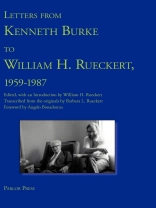These letters show the development of Burke’s thought in the last thirty or so years of his life, when he remained remarkably productive not only as a correspondent but as a critic and traveling scholar. Rueckert became for Burke both student and “co-conspirator, ” with Burke himself playing the roles of teacher, mentor, father, and peer. While Burke corresponded for many years with Malcolm Cowley, William Carlos Williams, Hugh Duncan, and others, with Rueckert, we see him writing to someone who may have understood and appreciated his work more than anyone.
Sobre el autor
Kenneth Burke (1897-1993) has been hailed by many as one of the most original thinkers of the twentieth century. In The Dictionary of Literary Biography, Paul Jay refers to him as “the most theoretically challenging, unorthodox, and sophisticated of twentieth-century speculators on literature and culture.” Geoffrey Hartman praised him as “the wild man of American criticism.” We see him (finally) represented in the influential Norton Anthology of Theory and Criticism. The Chronicle of Higher Education suggested in 2001 that Burke may have “accidentally create[d] cultural studies.” William H. Rueckert, the “Dean of Burke Studies, ” authored or edited numerous groundbreaking books and articles on Kenneth Burke. They include the landmark study, Kenneth Burke and the Drama of Human Relations (1963, 1982), Critical Responses to Kenneth Burke, 1924-1966 (1969), and Encounters with Kenneth Burke (1994). With Angelo Bonadonna, he is the editor of Burke’s On Human Nature, A Gathering While Everything Flows: Essays, 1967-1984 (2005). He is also the author of Glenway Wescott (1965) and the Parlor Press book, Faulkner From Within—Destructive and Generative Being in the Novels of William Faulkner (2005). His essays include the often-cited “Literature and Ecology: An Experiment in Ecocriticism.” Shortly before his death in late 2006, Rueckert published the long-awaited edition of Burke’s Essays Toward a Symbolic of Motives, 1950-1955.












